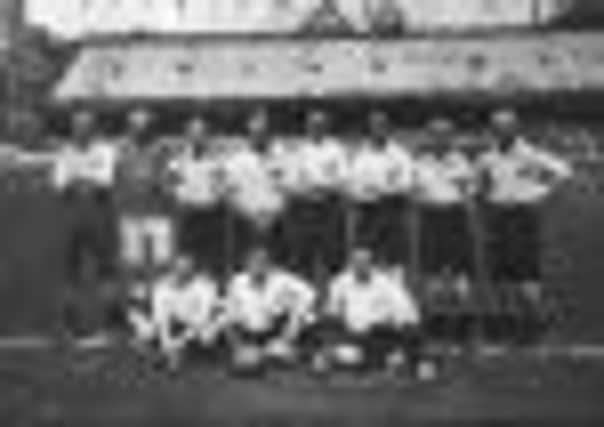How starring role in Olympics led to curtain call on stage and screen


“Harold who?” might come the reply.
His is not a name that trips off the tongue.
One hundred years ago, however, Walden was widely known in footballing circles.
A prolific striker for Bradford City, he was a veritable terror of First Division defences.
Advertisement
Hide AdAdvertisement
Hide AdAfter finishing as the league’s leading scorer in the 1911-12 season, Walden then shot to worldwide fame as he helped Great Britain’s football team win Olympic gold during the 1912 Stockholm Games.
Walden was the star of the tournament, scoring an amazing nine goals in the team’s three matches.
This included six in the opening game against Hungary, which Great Britain won 7-0.
Walden, who began his career with Halifax Town before joining Bradford in December 1911, was one of four players with Yorkshire connections in the 1912 squad.
Advertisement
Hide AdAdvertisement
Hide AdThere was goalkeeper Ronald Brebner, who played 23 games for Huddersfield Town before his tragic death at the age of 33 as a result of injuries sustained playing for Leicester Fosse.
Ivan Sharpe, a wily left-winger, was one of only a handful of men to have represented Leeds United and Leeds City, playing one game for the former in 1920 and 65 games for the latter between 1913 and 1919, and outside-left Gordon Wright served as captain of Hull City for seven seasons.
But it was Walden who was the team’s celebrity, Walden who captured the public imagination.
After his double hat-trick in the opening game, which was effectively the quarter-final stage of an 11-team tournament, Walden carried his form into the semi-final.
Advertisement
Hide AdAdvertisement
Hide AdHe scored twice against Finland as Great Britain eased to a 4-0 win.
Walden then set England on course for victory in the final, scoring the opening goal as Great Britain defeated Denmark 4-2.
At the time of his performance, Walden was 24 years old.
He had already led a multi-layered life, having joined the army at the age of 16 and served in India and Ireland.
Walden went on to serve during the First World War with the West Yorkshire Regiment, rising to the rank of captain and later becoming battalion adjutant.
Advertisement
Hide AdAdvertisement
Hide AdBut it was his second career that cemented his status as one of the game’s most interesting characters.
In 1919, while still playing football, Walden made his stage debut at Bradford’s Alhambra Theatre.
He sang at the piano during a lifeboat appeal show.
Francis Laidler, the theatre owner, was so impressed that he signed him up to appear for a week.
Walden decided to give up football and, from that day forward, never looked back.
Advertisement
Hide AdAdvertisement
Hide AdIn 1920, Walden began a brief flirtation with the film industry.
He featured in The Winning Goal, one of the earliest football-related movies, which was adapted from the Harold Brighouse play, The Game.
Walden made another film appearance when he played himself in Cup-Tie Honeymoon in 1948.
But films were only ever a diversion; singing was Walden’s forte in the entertainment industry and he went on to make at least two 78rpm records – Ronnie the Robin and also Mother I’m a Soldier.
Advertisement
Hide AdAdvertisement
Hide AdWalden also branched out into comedy while taking part in a tour of Australia. When the show’s comedian fell ill, Walden volunteered to step into the breach.
He dragged his hair forward on to his forehead to create a “kiss-curl” effect some three decades before Bill Haley made it his trademark. The look was completed by a straw hat borrowed from a bookmaker who happened to be standing at the side of the stage.
Walden’s second career very nearly came to a premature end following an incident with a paraffin lamp out in the Australian outback. Travelling on a covered wagon, he was lucky to escape with his life when someone knocked over the lamp and caused a fire.
Towards the end of his variety career, Walden became a member of the Ernest Binns Follies on Morecambe pier. One of his last appearances was in 1955 at a show to raise money for the Yorkshire Evening News’s Christmas Appeal; he died after suffering a heart attack on Leeds railway station a couple of weeks later.
Advertisement
Hide AdAdvertisement
Hide AdWalden’s name has drifted from memory, like a line of handwriting that has faded from view.
The names of Brebner, Sharpe and Wright are even more obscure and yet England could not have won the 1912 Olympic title without them.
Next year, it remains to be seen which players Great Britain head coach Stuart Pearce will have at his disposal.
Officials from the Wales, Scotland and Northern Ireland Football Associations do not want their players to take part in the tournament, which has caused much controversy ahead of the event.
Advertisement
Hide AdAdvertisement
Hide AdThere is talk of former England and Manchester United midfielder David Beckham possibly being available, but one thing is clear.
What Pearce would give for a Harry Walden – footballer, actor, performer extraordinaire.